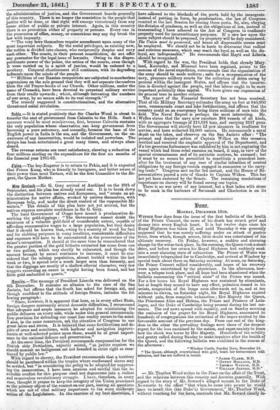intsrirs.—The message of President Lincoln was delivered on the 4th
December. It contains no allusion to the case of the San Jacinto, but affirms that the South has asked for foreign aid, and though confident in the attitude of foreign States, includes the fol- lowing paragraph:
"Since, however, it is apparent that here, as in every other State, foreign dangers necessarily attend domestic difficulties, I recommend that adequate and ample measures be adopted for maintaining the public defences on every side, while under this general recommenda- tion provision for defendhag, our coast line readily occurs to the mind. I also, in the same connexion, ask the attention of Congress to our great lakes and rivers. It is believed that some fortifications and de- pots of arms and munitions, with harbour and navigation improve- ments at well-selected points upon these, would be of great import- ance to the national defence and preservation."
At the same time, the President recommends compensation for the British ship Perthshire, unjustly seized, "as justice requires we should commit no belligerent act not founded in strict right as sanc- tioned by public law." With regard to slavery, the President recommends that a territory should be purchased within the tropics where confiscated slaves may be settled, but "in considering the policy to be adopted for suppress- ing the insurrection, I have been anxious and careful that the in- evitable conflict for this purpose shall not degenerate into a violent and remorseless revolutionary struggle. I have, therefore, in every case, thought it proper to keep the integrity of the Union prominent as the primary object of the contest on our part, leaving all questions which are not of vital military importance to the more deliberate action of the Legislature. In the exercise of my best‘ discretion, I •
have adhered to the blockade of the ports held by the insurgents instead of putting in force, by proclamation, the law of Congress enacted at the last Session for closing those ports. So, also, obeying the dictates of prudence, as well as the obligations of law, instead of transcending I have adhered to the Act of Congress to confiscate property used for insurrectionary purposes. If a new law upon the same subject should be proposed, its propriety will be duly considered. The Milan must be preserved, and hence all dispensable means must be employed. We should not be in haste to determine that radical and extreme measures, which may reach the loyal as well as the dis- loyal, are indispensable." He recommends that Hayti and Liberia should be recognized. With regard to the war, the President holds that already Mary- land, Kentucky, and Missouri have been regained, points to the success of the naval expedition, recommends that the organization of the army should be made uniform, calls for a reorganization of the navy, proposes military courts for the collection of debts owing by persons within the insurgent States, and affirms that the insurrec- tion is directed against the people, and that labour ought to be more important politically than capital. We have given our impression of its general tone in another column.
The report of the Financial Secretary has not been received. That of the Military Secretary estimates the army on foot at 640,000 men, recommends coast and lake fortifications, and affirms that the country could on an emergency bring three millions of men into the field. The Naval Report is perhaps the most interesting. Mr. Welles states that the navy now numbers 264 vessels of all kinds, with an aggregate tonnage of 218,016 tons, and carrying 2557 guns. The Government will shortly have 52 new steamers in readiness for service, and have collected 22,000 sailors. He recommends a naval depot on the lakes, and observes on the San Jacinto affair : "The prompt and decisive action of Captain Wilkes on this occasion merited and received the emphatic approval of the Department, and if a too generous forbearance was exhibited by him in not capturing the vessel which had these rebel enemies on board, it may, in view of the special circumstances and of its patriotic motives, be excused ; but it must by no means be permitted to constitute a precedent here- after for the treatment of any case of similar infraction of neutral obligations by any foreign vessels engaged in commerce or the carry- ing trade." Congress met on the 3rd instant, and the House of Re- presentatives passed a vote of thanks to Captain Wilkes. This has not yet been endorsed by the Senate. The remaining resolutions of importance on slavery will be found among our topics. There is no war news of any interest, but a fleet laden with stone to be sunk in the harbours of Savannah and Charleston is on its way.






























 Previous page
Previous page